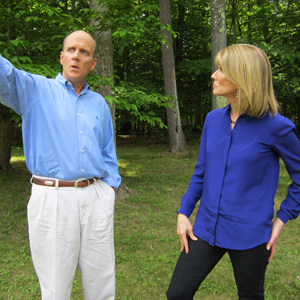48 Hours: The Trials of Cal Harris
Erin Moriarty is a "48 Hours" correspondent. Here, she weighs in on her interview with accused killer Cal Harris, tried three times in his wife's mysterious disappearance.
TIOGA COUNTY, N.Y. -- What is it like to finally meet the accused killer you've waited years to interview?
"48 Hours" has followed the case of Cal Harris, the man accused of killing his wife, for nine years - and we waited seven of them to interview him. Michele, 35, a beautiful young mother of four children, vanished sometime late on the night of Sept.11, 2001 and has not been seen since.
Almost six years later, in 2007, Cal Harris, a wealthy car dealer in upstate New York, went on trial for her murder, but there wasn't much evidence against him. Michele's body had never been found so there was no murder weapon, no cause of death. There were just a few drops of her blood found in the family's kitchen and garage where investigators believe Harris hit and killed his wife.
Other incriminating evidence against Harris involved his own behavior -- what he did after his wife disappeared and what he didn't do.
The couple, while estranged and in the middle of a contentious divorce, still lived together in the same home. Michele was always there in the morning to get the children up and ready. Yet, on the morning of September 12th, when Cal Harris discovered his wife wasn't there, why didn't he call her cell phone, wondering where she was?
Instead, Harris called the nanny and asked that she come early to help him. The nanny, Barb Thayer, recalls that the kitchen was unusually clean when she arrived, especially the kitchen counters which were ordinarily cluttered with the children's notebooks and belongings. Now they were clean.
She also remembers an unusual request that Harris made when he learned that his missing wife's minivan was still at the end of the family driveway. He asked Thayer to drive Michele's vehicle to his car dealership so that he could clean it
"He said 'oh my gosh, this car is a mess....I want you to drop it off at the dealership and I'm gonna clean it from top to bottom," Thayer recounts. "It just reinforced that, to me, that there was something wrong."
Almost a month after his wife disappeared, Harris brought a girlfriend to spend the night at the house, assuring her that Michele would not return. What's more, Thayer says, "He never asked me, 'Have you heard from Michele? Did Michele call you? Is she wondering where the kids are?' He never mentioned Michele to me. And I worked for him for a solid year afterward."
Harris's troubling behavior was an issue we hoped he'd address when he went to trial in 2007, but Harris refused all interviews and never spoke publicly, not even to the jurors at trial who eventually convicted him of murder.
Before Harris was sentenced, a new witness came forward, Kevin Tubbs. Tubbs said he had been driving past the Harris home early on the morning of Sept. 12, 2001 and saw a blonde woman arguing with an unknown man at the end of the driveway. If that woman was, in fact, Michele Harris, her husband wouldn't have had time to kill her. So, instead of sentencing Harris, the judge threw out his conviction.Harris still had nothing to say publicly when he was allowed out on bail so he could return home to his four children.
In 2009, when Harris went on trial for a second time, again, he refused to speak to the press, but this time, he did take the stand and testify. He strongly contradicted the testimony of Barb Thayer and Michele's family members who described him as callous and controlling after Michele's disappearance, but he couldn't sway the second jury. Twelve more people found him guilty of Michele's murder.
Harris spent three and a half years in prison and then once again, in the fall of 2012, his conviction was overturned on appeal, this time, because the judge in the second trial improperly allowed hearsay testimony in as evidence. Cal remained silent publicly when he went home on bail.
During the entire seven years of trials and appeals, we asked Cal Harris, through his ever changing team of lawyers, for a chance to talk to client.
The answer was always "no." Until last year.
In June 2014, inside Harris' home in rural Tioga County, New York, now aglow with bright television lights, I sat down across from him and his new lead attorney, Bruce Barket. Harris was clearly nervous, his left knee bouncing as he sat waiting for us to begin.
The man who refused to talk to reporters for seven years was suddenly more than willing to talk....about himself. He insisted that he had been unfairly portrayed in the press.
"That I'm this cold, calculating killer, that this is all about money," Harris complained, "People are only getting one side of the story."
He talked, often tearfully, for over an hour about what he and his children have gone through since Michele disappeared. "I feel like I'm being kidnapped in broad daylight in front of my kids, in front of everyone and no one can do anything about it," he said.
Still, Harris would not discuss specifics about the day she disappeared or his marital relationship. His attorneys made him available only if we would agree to certain restrictions and not discuss issues likely to come up at trial.
The interview reveals a side he has never shown publicly; he is thoughtful, emotional and clearly devoted to his four children. And when asked point blank whether he killed his wife, he says no. Still, some of the most important questions about what he did in the days following his wife's disappearance are left unanswered.
Harris has now stood trial a third time, and a third jury has gotten the chance to review the case against him. He won a change of venue, so the latest trial was held in a different county, two hours away, where people are less familiar with his case.
We were there for the outcome - and it's one you won't believe.
See Erin Moriarty's full interview with Harris during "Cal Harris: Deadlocked," airing Saturday at 10 p.m. ET/PT on CBS.

